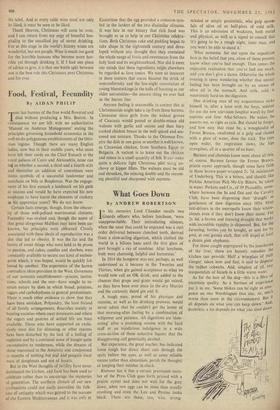What Goes Down
By ANDREW ROBERTSON N his memoirs Lord Chandos recalls two 1Guards officers who, before luncheon, 'were unapproachable. Their intimidating silences, when the most that, could be expected was a curt order delivered between clenched teeth, derived from a slow-acting digestion, which clothed the world in a bilious haze until the first glass of port brought a ray of sunshine. After luncheon, both were charming, helpful and humorous.' In 1914 the hangover was not, perhaps, as well understood as it became in the Twenties and Thirties, when gin gained acceptance as what we would now call an OK drink, and added to the chances that grape and grain would get mixed, as they have been ever since in the dry Martini and the curiously dated gin and It.
A tough man, proud of his physique and stamina, as well as his drinking prowess, would never admit that he couldn't get the better of that morning-after feeling by a combination of willpower and patience. All digestions are 'slow- acting' after a punishing session with the hard stuff or an injudicious indulgence in a wide cross-section of those seductive liquors that the disapproving call generically alcohol.
But experience, the great teacher, has indicated some rough but direct short cuts through the spots before the eyes, as well as some reliable means (other than abstention, perish the thought) of keeping their number in check.
Rumour has it that a certain prominent mem- ber of the Press Club goes forth primed with a prairie oyster and does not wait for the grey dawn, when raw eggs can be more than usually revolting and even the Lea and Perrins looks black. There are those, too, wise, strong- minded or simply pessimistic, who gulp spoon- fuls of olive oil or half-pints of cold milk.
This is an admission of weakness, both moral and physical, as well as a signal to oneself that `it's going to be a rough night, inner man, and you won't be able to stand it.'
What nonsense. Set out upon the expedition firm in the belief that you, alone of those present, know when you've had enough. Then comes the enjoyable realisation that you've had too much, and you don't give a damn. Otherwise the whole evening is spent wondering whether that uneasY feeling has been brought on by an excess of olive oil in the stomach. And milk, cold, is notoriously hard on the digestion.
One drinking man of my acquaintance tucks himself in, after a bout with the boys, sedated (to use the new television hospital word) by four aspirins and four Alka-Seltzers. He wakes, he assures me, as right as rain. But should he forget, and how easy that must be, a wineglassful of Fernet Branca, swallowed at a gulp and chased with a glass of water, does the trick. The eyes open wider, the respiration slows, the legs strengthen, all in a quarter of an hour.
Barmen and chemists know most about all this, of course. Barmen favour the Fernet Branca, prairie oyster approach, though some have faith in those brown-paper-wrapped 2s. 7d. miniatures of Underberg. This is a bitters, and should, like Perkins American Pick-Me-Up Bitters, be taken in water. Perkins and Co., of 99 Piccadilly, some- where between the In and Out and the Cavalry Club, have been dispensing their 'draught' to gentlemen of slow digestion since 1854. Most taxi-drivers in the metropolis know their where- abouts even if they don't know their name. For 2s. 6d. a brown and foaming draught that works with incredible rapidity is dispensed. But, for the farseeing, bottles can be bought, or sent for by post, at one guinea each, that will dispel at least a dozen pink elephants.
For those caught unprepared by the treacheries of the liver, there are homely remedies the kitchen can provide. Half a wineglass of malt vinegar, taken neat and fast, is said to disperse the redhot cobwebs. And, simplest of all, two teaspoonfuls of bicarb in a little warm water. As for the hair of the dog—this is a fibre of uncertain quality. As a barman of experience put it to me, 'Some blokes can be right as nine" pence on two Worthington (not one, sir, one's worse than none in the circumstances). But it all depends on what you can keep down.' And, doubtless, a lot depends on what you send down•










































































 Previous page
Previous page